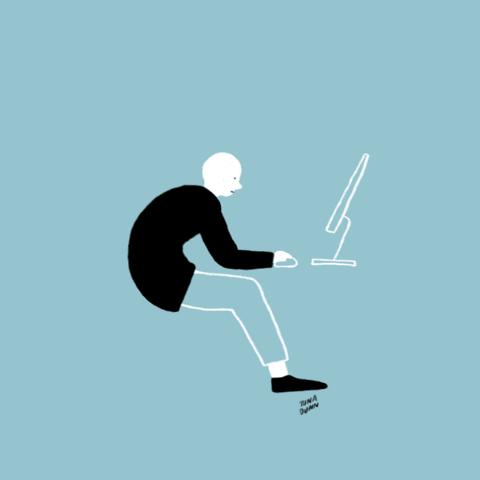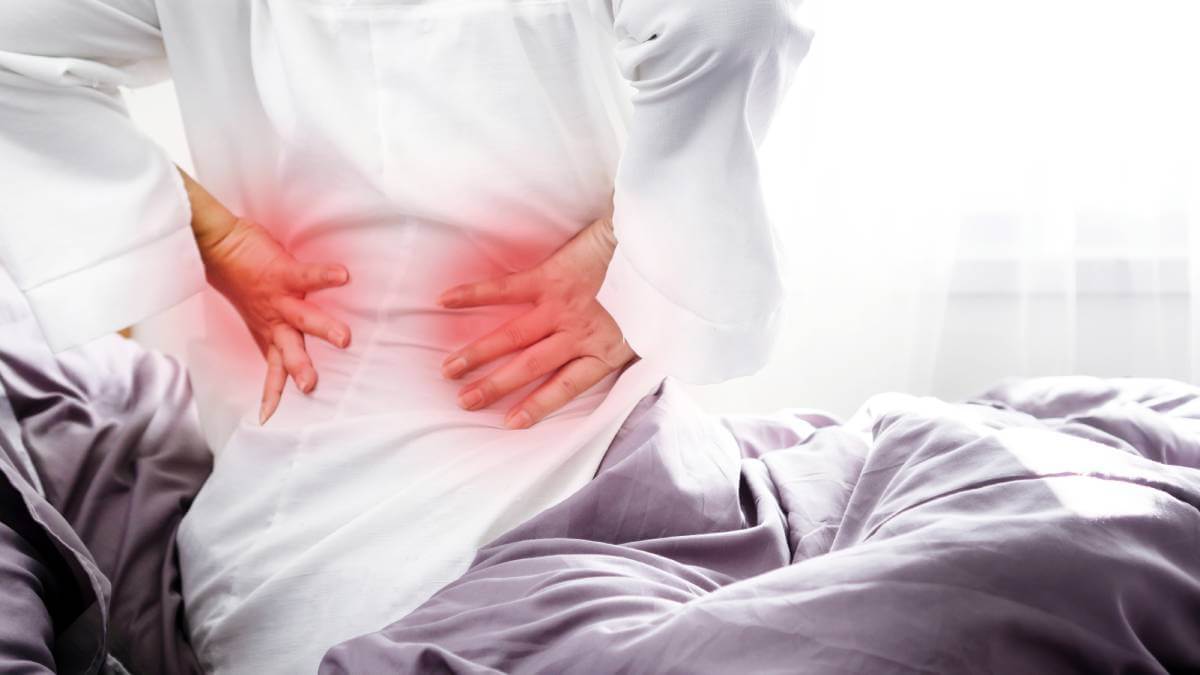Many of us spend most of the day hunched over a desk, which can make maintaining good posture feel like an uphill battle.
Long-term poor posture can have multiple knock-on effects. These include joint stiffness, muscle soreness and tightness, tendon pain, inflammation and, sometimes, nerve pains or headaches, says physiotherapist Valentina Roffi.
It’s important to remember that posture isn’t the only factor in back and neck pain, and if you are concerned about any symptoms or issues with your joints and posture, it’s always best to speak to a qualified healthcare professional and seek an assessment and tailored advice.
Generally speaking, being mindful of slouching and keeping a check on aches and pains, especially if you work at a desk all day, can be beneficial.
Here are some of the key signs you’re slouching, and what you can do to help address it.
1. Slumped shoulders

This is one of the most obvious signs of poor posture. “It’s often a result of sitting at a desk and leaning forward over a computer,” explains physiotherapist Mike Primett. “Excessive time like this can lead to a tightening of the muscles in the shoulders and weakening of the back muscles causing your shoulders to slump.”
Mr Primett’s top tip for combating this is regular stretching. “Stand with your hands by your sides, palms facing forwards, squeeze your shoulder blades together and slowly lift your arms until you feel a stretch in the muscles of the chest and shoulder,” he says. “Repeat three to five times. Another good remedy is shoulder lifts, where you slowly lift your shoulders towards your ears as you inhale, then roll them back down while you exhale.”
Ms Roffi also recommends taking micro-breaks throughout the day. “No matter how ideally set up your work environment is, it cannot protect you from the dangers of being in a static position for hours every day,” she says. “So make sure you set a timer to move every hour and change position.”
2. Neck pain
Slightly tipping your head forward is often referred to as ‘tech neck’ or ‘text neck’, because it’s very often caused by constantly peering down at your smartphone. “The forward slant of the next places more stress on the cervical spine, creating a muscle imbalance, as the neck finds it harder to hold the head in this position,” Mr Primett explains.
As well as avoiding spending a lot of time glancing downwards at your phone or tablet, obviously, muscle strengthening exercises can help combat this, with the physiotherapist recommending chin tucks. “You can do these by sitting up tall in a chair, keeping your chin parallel to the floor,” Mr Primett advises. “Gently move your head and chin backwards, without tilting your head. You should feel this stretch the back of your neck. Then push your head up away from your neck, as if you were being pulled upwards, keeping your jaw relaxed and hold the position for three deep breaths.”
Also, set your desk up properly. Make sure it is ergonomically sound to avoid placing excess stress on your arms, neck or back. Ensure your screen is at the right height for your eyes, your keyboard within easy reach to avoid straining forwards to reach, and ensure your back and feet are well supported.
3. Recurring headaches

Poor posture can possibly affect other areas of the body too. Although headaches can have many causes, they can sometimes be caused by your head leaning forward, which puts pressure on the neck and spine that can spread to the back of the skull.
As there are so many complex causes of headaches, Mr Primett recommends consulting your doctor first. “If it’s confirmed that they’re linked to posture, a physio will be able to look at the strength and mobility in the neck,” he says. “They will advise a strengthening and stretching program to help relieve symptoms. You can also try massaging the back of the neck to relieve pressure.”
4. Back pain

This is another possible side-effect of poor posture, as the muscle imbalance can put pressure on your back. Mr Primett says: “Depending on your posture, you may experience pain in different areas of your back. Many people find they suffer with pain in their lower back due to bad posture.”
It’s important to get an assessment, if you’re experiencing ongoing or worsening back pain. However, stretching can often help. Mr Primett recommends you “sit up straight in a chair with your hands on your thighs and your shoulders down. Pull your shoulders back, squeeze the shoulder blades together and hold for five seconds. Repeat this three to four times daily, to engage your back muscles and work on your posture.”
Looking after your body generally will also help. The fitter we keep our bodies, the better. Taking steps to protect our joints is something we should all be doing. It can be as simple as undertaking regular exercises to increase our strength and shock-absorbency around our joints, as well as including flexibility exercises to maintain mobility.
5. Tilted pelvis
Top 5 Hip Mobility Exercises ✨For #WorldHealthDay we’re looking into tight hips/hip flexors. A common issue for those who find themselves sitting/driving for long periods of time. These 5 exercises will allow you to improve the range of motion of all actions of the hip joint. pic.twitter.com/VJOULN0jvm
— Setanta College (@SetantaCollege) April 7, 2019
“Sitting for a long period of time, particularly if you have an office job, can cause tightness in your hips,” Mr Primett says. “This can result in your pelvis rotating forward and causing pain.”
Strengthening your glutes can help with this, with the physiotherapist advising you work squats, lunges and planks into your exercise routine (always check with your own doctor or physio before embarking on a new exercise regime). As with any of these problems, making sure you’re sitting up straight at your desk will go a long way.
Do you worry about your posture? What do you do to improve it? Why not share your experience in the comments section below?
Also read: Can inversion therapy cure back pain?
– With PA
Disclaimer: This article contains general information about health issues and is not advice. For health advice, consult your medical practitioner.

